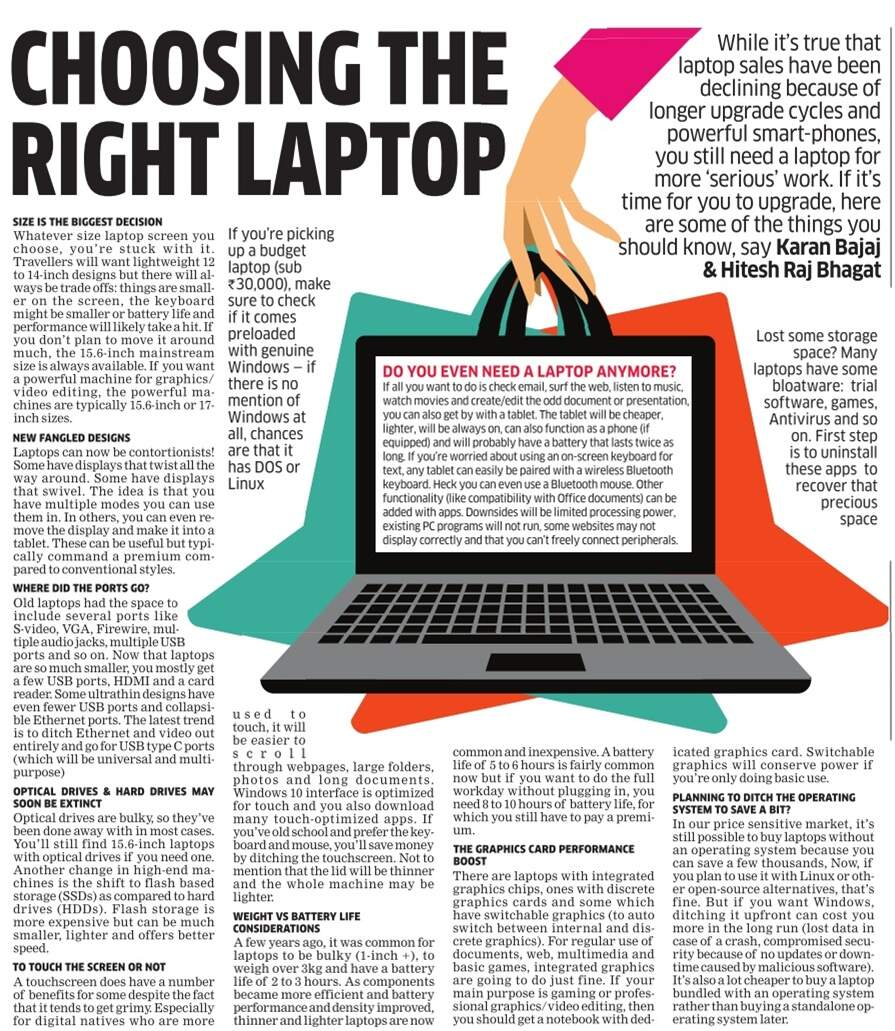Are you in the market for a new laptop but feeling overwhelmed by the myriad options available?
Look no further; this article will guide you through choosing the perfect laptop explicitly tailored to your needs.
We’ve got you covered from determining your usage requirements to considering key features and specifications.
So, please sit back and relax as we take you on a journey to finding your ideal laptop companion.
Review contents
Budget Considerations
When choosing a laptop, your budget is one of the first considerations you should have. Determining how much you are willing to spend will help narrow your options and ensure you get the best value. Evaluate your finances and set a reasonable budget that fits your needs. Remember, balancing affordability and quality is essential when looking for a laptop.
After determining your budget, conducting thorough research on the market is crucial. Understanding the current laptop trends and prices will give you a good idea of what to expect and help you make an informed decision. Look for reliable sources like technology websites, customer reviews, and expert opinions. Doing so lets you gain valuable insights into the available laptop models and their respective features and performance levels. Additionally, researching the market will enable you to spot any promotions or discounts that may be available, potentially saving you some extra cash.
When choosing a laptop, it is essential to consider the tradeoffs that come with specific features. Assess your needs and priorities and determine which aspects of a laptop are most important to you.
For example, suppose you require a high-performing processor for demanding tasks such as gaming or video editing. In that case, you may need to sacrifice some storage capacity or opt for a more affordable model. By understanding the tradeoffs and making informed decisions, you can find a laptop that meets your budget while fulfilling your needs and expectations.
Usage Requirements
To find the right laptop for your needs, you must first identify what those needs are. Consider the primary purpose of your laptop usage. Are you primarily using it for work, education, entertainment, or a combination?
Understanding your usage requirements will help narrow down the features and specifications that are most important to you. For example, a graphic designer may want a laptop with a high-resolution display and a powerful graphics card.
It’s also important to consider any potential future needs. Think about how your laptop usage may change over time. Will you need more processing power? More storage space? The ability to connect multiple monitors?
By anticipating your future needs, you can choose a laptop that will continue to meet your requirements even as they evolve. This foresight will save you from having to replace your laptop too soon and will ensure that you can adapt to any changes in your lifestyle or professional demands.
Operating System
Regarding your laptop’s operating system (OS), several options exist. The most popular choices are Windows, macOS, and Linux. Understanding the differences in these OS options is crucial as it will impact your overall user experience. Consider factors such as familiarity and compatibility with specific software or applications. If you are already comfortable using a particular OS or have specific software requirements, choosing a laptop with an OS that supports those needs is essential.
Additionally, exploring the features and performance of different operating systems can help you make an informed decision. Each OS has unique features and functionality, so it’s worth considering how those align with your needs.
For example, macOS might be the right choice if you value seamless integration with other Apple devices and a user-friendly interface. On the other hand, if you prefer a more customizable and versatile option, Windows or Linux might be a better fit. Take your time to explore the different OS options and ensure that your chosen laptop’s OS aligns with your preferences and requirements.
Size and Portability
The size and portability of a laptop are essential factors to consider, as they will determine how easily you can carry and use your device. When determining your preferred screen size, consider the tasks you’ll perform and your comfort.
Smaller screens, such as those in ultra-portable laptops, are typically lighter and more compact, making them suitable for frequent travelers or those who value mobility. Conversely, larger screens offer a more immersive viewing experience for activities like entertainment or graphic design but come with added weight and bulk.
In addition to screen size, consider the weight and thickness of the laptop. If you plan on carrying your laptop around frequently, a lightweight and slim design may be more practical. However, ultra-portable laptops may sacrifice certain features or performance capabilities to achieve their compact form. It’s essential to balance portability and the functionality you require.
Convertible or 2-in-1 laptops are also worth exploring, especially if you value versatility. These laptops can transform into different modes, such as a tablet or tent mode, providing flexibility for various use cases. If you enjoy touchscreen functionality or need a device for note-taking or drawing, a convertible option may fit you.
Processor
The processor is often considered the laptop’s brain, responsible for executing commands and running applications. When choosing a laptop, understanding different processor models is crucial. Processors are typically categorized into families, such as Intel Core i3, i5, and i7, or AMD Ryzen 3, 5, and 7. Each family offers different levels of performance and power efficiency.
Consider your specific needs when comparing processor models. A lower-end processor will likely suffice if you primarily use your laptop for basic tasks like web browsing, word processing, or streaming. However, a more powerful processor will be necessary if you require a laptop for demanding applications like video editing, gaming, or running virtual machines.
Furthermore, if gaming or multimedia is your priority, it’s worth exploring laptop models with dedicated graphics processors (GPUs). These GPUs provide enhanced performance for graphics-intensive tasks and can significantly enhance your gaming or content creation experience. However, remember that dedicated GPUs can significantly impact the price and portability of your laptop.
RAM and Storage
RAM (Random Access Memory) and storage are two critical components that directly impact the speed and performance of your laptop. To determine the adequate RAM capacity for your needs, consider the type of tasks you’ll be performing. Basic tasks like web browsing and word processing generally require 4GB to 8GB of RAM. More demanding tasks like video editing or running virtual machines may require 16GB or more. Adequate RAM ensures smooth multitasking and prevents your laptop from slowing down when running multiple applications simultaneously.
Regarding storage, laptops typically offer two main types: solid-state drives (SSDs) or hard disk drives (HDDs). SSDs are faster, more reliable, and quieter than HDDs, making them the preferred choice for most users.
However, SSDs are more expensive and may have lower storage capacities than HDDs. Consider your storage needs and budget to determine the best option. Some laptops also offer a combination of SSD and HDD, allowing you to have the benefits of faster storage and ample space.
Graphics
When considering the graphics capabilities of a laptop, it’s essential to understand the difference between integrated and dedicated graphics. Integrated graphics refer to a graphics processor built into the laptop’s central processor. These graphics processors suit basic tasks like web browsing, word processing, and media playback. However, they may struggle when it comes to gaming or graphics-intensive applications.
If gaming or content creation is your priority, it’s worth exploring laptops with dedicated graphics processors. Dedicated graphics cards are separate processors solely dedicated to handling graphics-related tasks. They provide better performance and smoother gameplay for demanding games and can significantly enhance your content creation workflow. However, laptops with dedicated graphics processors may have a higher price tag and sacrifice portability due to additional cooling requirements.
It’s essential to understand the different options available for dedicated graphics. Nvidia and AMD are the dominant players in the GPU market, each offering various models with varying performance levels. If you are a gamer or content creator, research the recommended GPU specifications for the games or applications you plan to run to ensure your chosen laptop meets your requirements.
Battery Life
Battery life is crucial, especially if you plan on using your laptop on the go or when access to power outlets may be limited. Evaluating the battery capacity and runtime of different laptop models will help you make an informed decision. Look for laptops with extended battery life or additional battery-saving features.
Consider the power-saving features available on the laptop you are considering. Some laptops may offer power management options or battery optimization settings that allow you to maximize your battery life by adjusting performance levels or turning off unnecessary features. Utilizing these features can extend your laptop’s battery life and minimize the need for frequent charging.
Fast-charging options are also worth exploring, especially if you often need to charge your laptop quickly. Some laptops offer fast charging capabilities, allowing you to recharge your battery to a reasonable level in a short amount of time. This feature can be particularly convenient for travelers or individuals constantly moving.
Connectivity
Consider the connectivity options available on the laptop you are considering. Explore the available ports and connections to ensure that they meet your needs. Standard ports include USB-A, USB-C, HDMI, and audio jacks. If you use external devices such as printers, hard drives, or monitors, verify that the laptop has the necessary ports to connect these devices. Additionally, consider the number of ports available. An ample number of ports can provide more convenience and flexibility in connecting various peripherals.
Wireless connectivity is also essential to consider. Most laptops come equipped with Wi-Fi capabilities, but verifying the Wi-Fi standards supported by the laptop is worth verifying.
The latest standard, Wi-Fi 6 (802.11ax), offers faster speeds and improved performance compared to older standards. If you frequently transfer large files over a wireless network or require fast internet speeds, a laptop with Wi-Fi 6 capability may be beneficial.
Another aspect of connectivity to evaluate is Bluetooth and audio capabilities. Bluetooth lets you connect your laptop’s wireless devices, such as headphones, speakers, and keyboards. Confirm that the laptop has Bluetooth functionality and supports the Bluetooth version needed for your devices. Consider the laptop’s audio capabilities, especially if you value high-quality sound. Some laptops offer enhanced audio technologies or built-in speakers that provide a better audio experience.
Brand and Warranty
When making a significant purchase like a laptop, it’s essential to research different laptop brands. Each brand has its strengths and weaknesses, and by understanding its reputation and customer support, you can make a more informed decision. Look for brands with a track record of reliability and customer satisfaction. Reading customer reviews and seeking recommendations from trusted sources can provide valuable insights into the overall quality of a brand’s products and services.
Additionally, consider the warranty coverage offered by the laptop manufacturer. Accidents happen, and having a comprehensive warranty can provide peace of mind. Research the warranty options, including the duration and coverage, to ensure that you are protected in case of any unforeseen issues with your laptop. Some manufacturers offer extended warranties or the option to purchase additional coverage, giving you protection beyond the standard warranty.
In conclusion, choosing the right laptop for your needs requires careful consideration of various factors.
Determining your budget, researching the market, and understanding the tradeoffs are crucial. Identifying your usage requirements, primary use, and future needs will help narrow your options. Understanding different operating system options, considering familiarity and compatibility, and exploring features and performance will guide your decision.
Furthermore, evaluating size and portability, processor models, RAM and storage capacities, graphics capabilities, battery life, connectivity options, and brand reputation will ensure you choose the laptop that best suits your needs.
By following these guidelines and taking the time to research and evaluate your options thoroughly, you can find the perfect laptop that will meet your requirements and provide an excellent user experience.




































